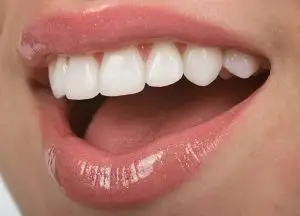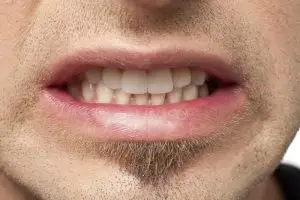Is your chipped tooth a dental emergency? It depends. A minor chip that causes no pain needs less care than a large chip that causes excruciating pain. Whether you need to get to the dentist immediately or whether it can wait until Monday depends on a lot of factors including how your tooth was chipped and how much pain you feel.
Big or small, here’s what you need to do if you chip your tooth.
What to Do While You’re at Home
 The most important thing is not to panic. You may have been in a big accident which is stressful enough or you might have bitten down on a too-hard food. Chipped teeth happen for a number of reasons but they can all be cared for at home in similar ways.
The most important thing is not to panic. You may have been in a big accident which is stressful enough or you might have bitten down on a too-hard food. Chipped teeth happen for a number of reasons but they can all be cared for at home in similar ways.
- Rinse your mouth using warm, salt water. This helps prevent an infection.
- If you’re tooth is bleeding, apply pressure with a cloth or piece of gauze.
- Use an ice pack, indirectly, to reduce swelling. Don’t apply ice directly to your tooth and gum, but on your cheek or jaw.
- You can use dental cement to cover and protect the chipped tooth if you can’t get into see your dentist right away.
- Apply dental wax over the chip to protect your mouth from any sharp edges where your tooth is chipped.
- Take over-the-counter (OTC) pain medication if you’re feeling aches and pains.
- For large chips, try to save the piece of your tooth that broke off for your dentist. In some cases, it can be reattached through bonding.
When should you call your emergency dentist? If you’re feeling pain, experiencing swelling, or bleeding, call as soon as you can. The at-home remedies can help you until you can see your dentist, but don’t wait to make an appointment if you can get in sooner.
Options to Repair Your Chipped Tooth
 How your tooth will be repaired depends on the location and severity of the chip. Your dentist will let you know what the best options are for you.
How your tooth will be repaired depends on the location and severity of the chip. Your dentist will let you know what the best options are for you.
- Small chips can often be polished to smooth out the sharp edges.
- Bonding is typically used on front teeth to reduce or eliminate the appearance of the chip entirely.
- Chipped molars are repaired with filling.
- For extensive damage, a crown or cap may be used to prevent your tooth from getting worse over time.
- Some patients opt for porcelain veneers which cover the tooth completely and hide any chips. This option is not usually covered by dental insurance but might be one you want to consider.
For extensive chips that cause cracks or breaks in your tooth, a root canal may be needed done to prevent further infection, decay, and/or nerve pain.
What Causes a Chipped Tooth
 There are multiple reasons why your tooth might chip. Some things you can prevent and some you can’t.
There are multiple reasons why your tooth might chip. Some things you can prevent and some you can’t.
- Cavities: It’s not a straight line from cavity to chipped tooth, but they do weaken your teeth and make it easier for chips to happen over time.
- Biting down too hard: A too-hard clack of your teeth might chip your tooth, especially if they’ve become weak from poor hygiene or excessive cavities.
- Biting or chewing hard food: Ice, hard candy, and a number of other hard foods can cause a chipped tooth.
- Hard hit to the face: This is the one that you don’t usually see coming. Car accidents, sports, and rough play can all lead to something hitting you in the mouth and chipping your tooth.
- Excessive teeth grinding: All the wear and tear on your teeth as you constantly grind can chip a tooth.
- Poor dental hygiene: Not taking care of your teeth properly can weaken your teeth or cause thin or worn tooth enamel.
Conclusion
Not every chipped tooth will be a dental emergency, but they’re not something to take lightly, either. If you’re experiencing pain, swelling, or bleeding, call your dentist. If you’re feeling okay, don’t ignore it but call your dentist the next day they’re available. Take care of your teeth and come in for regular check-ups to prevent the weakening of your enamel and teeth. Remember, if you chip a tooth, you have more options than you realize to get it fixed.
